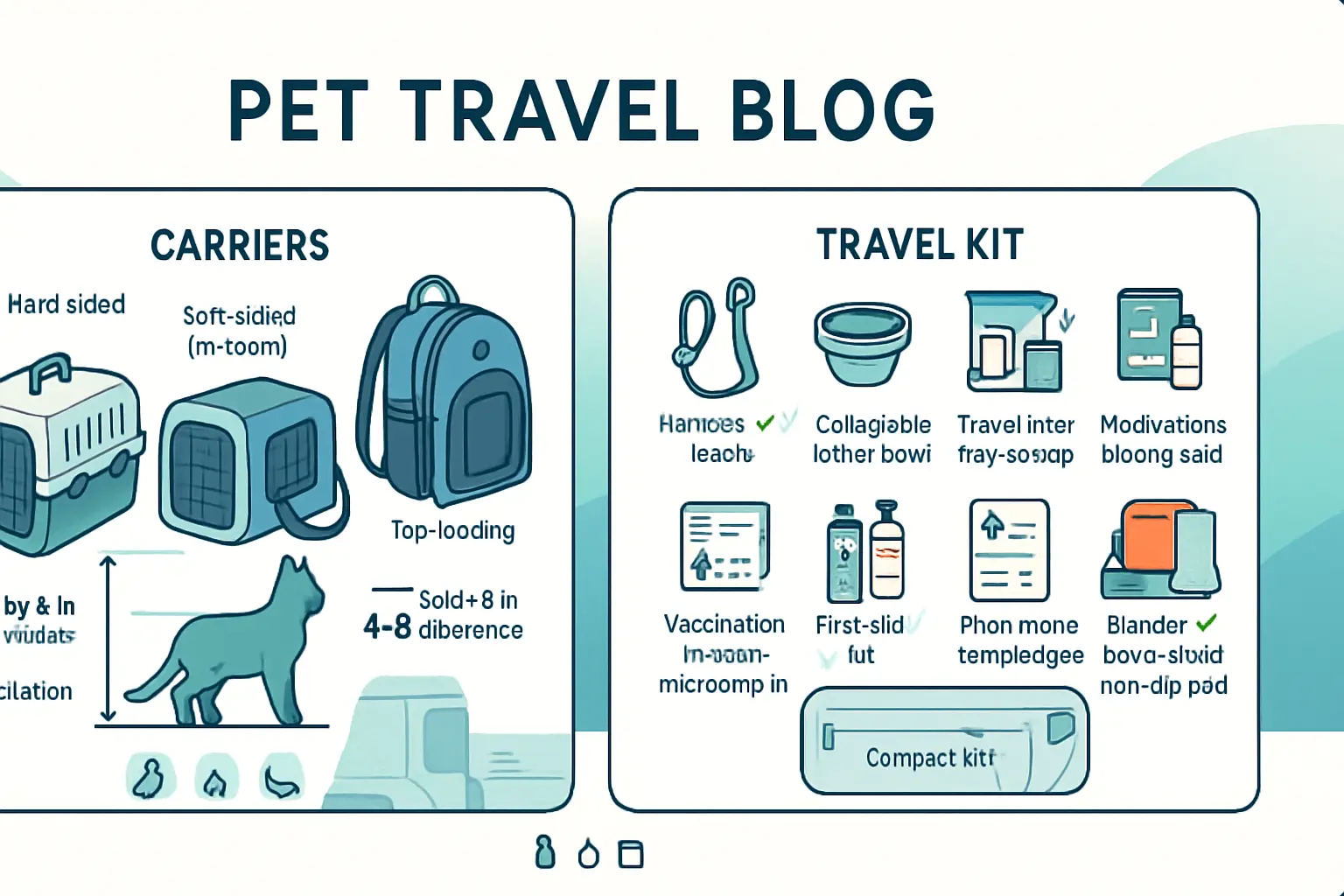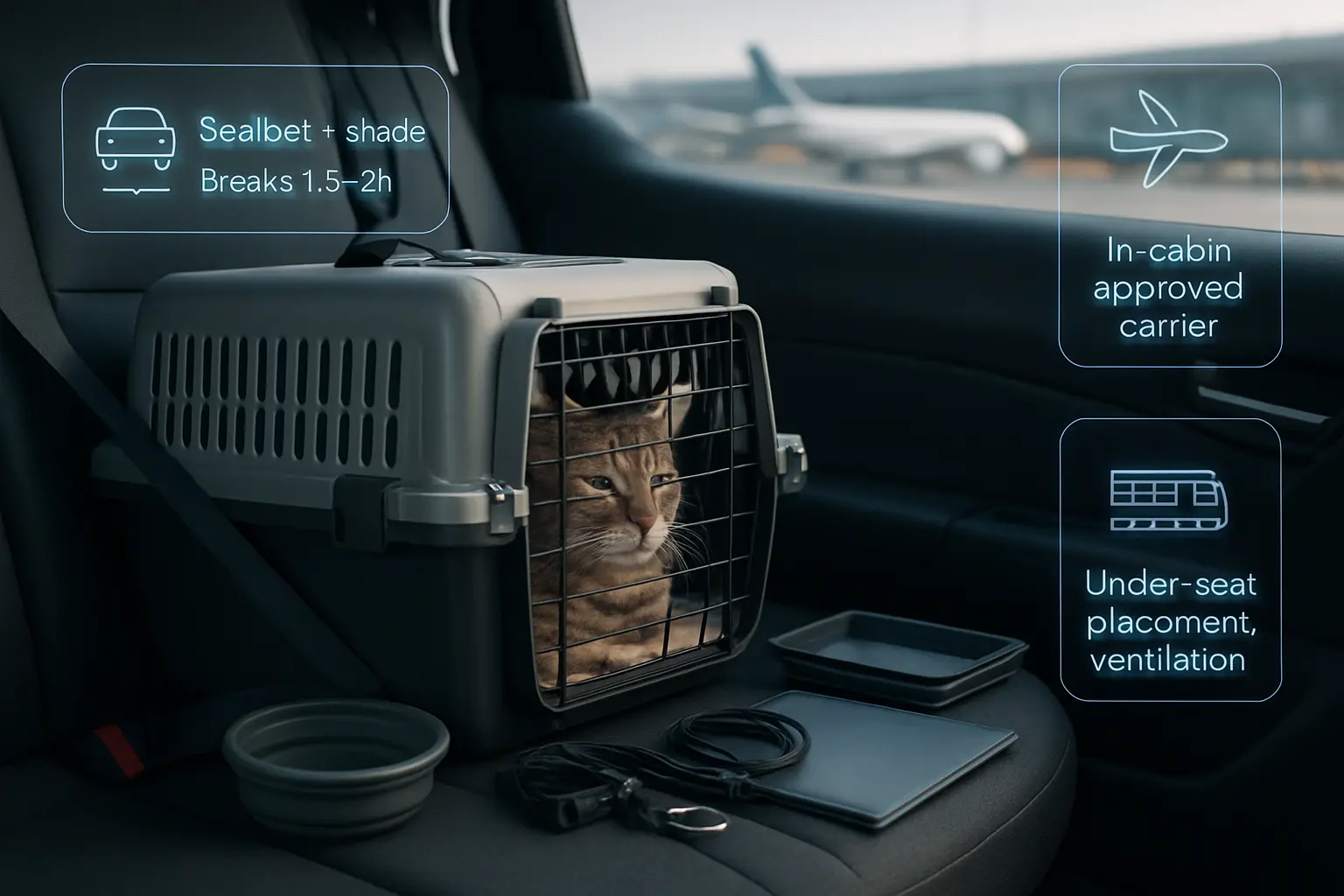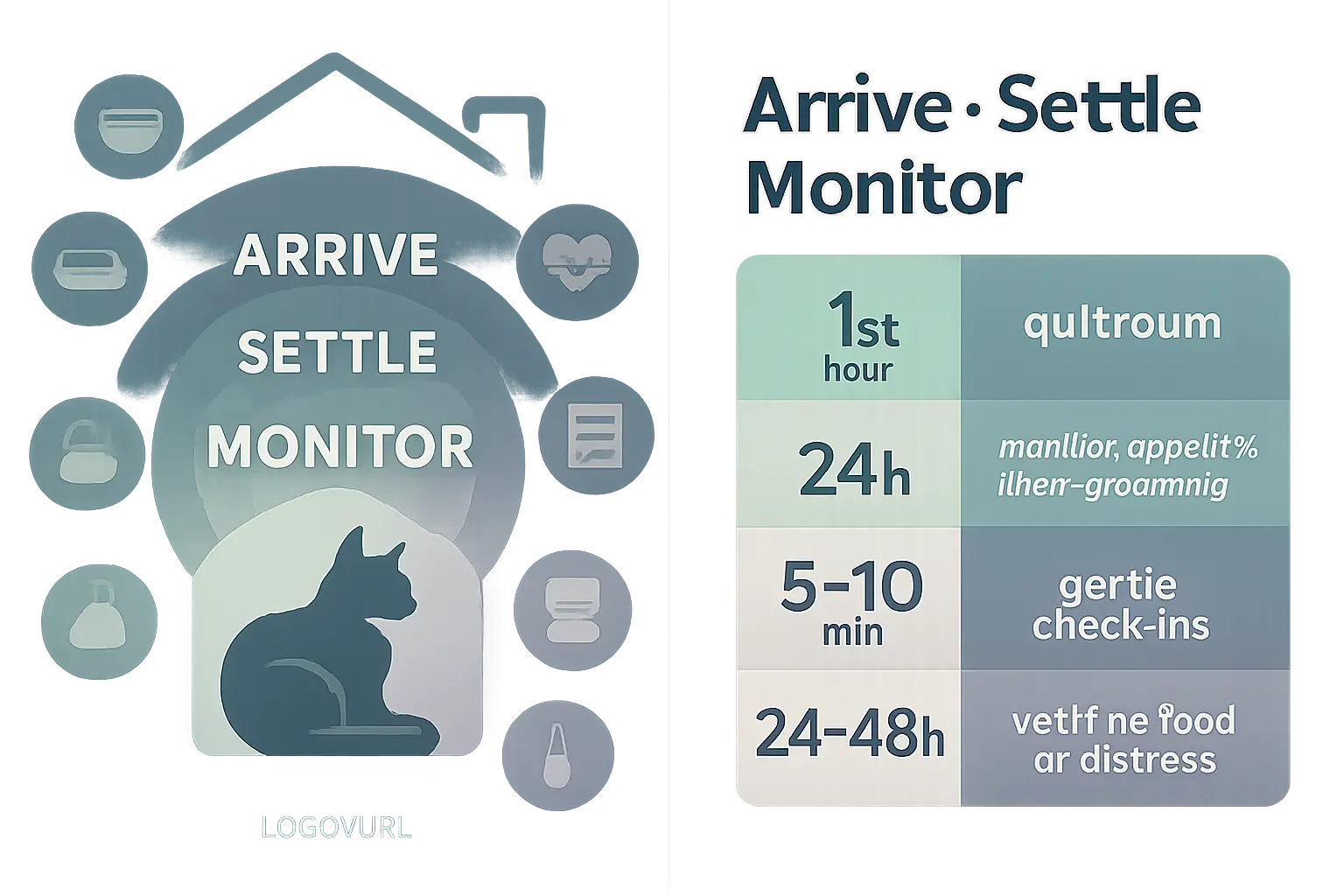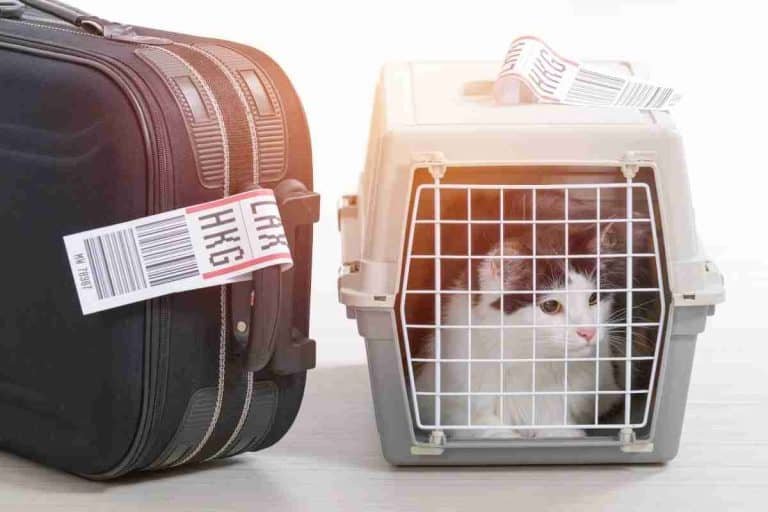How to Travel with a Fussy Feline: The Complete Stress‑Free Guide
Affiliate Disclaimer: As an affiliate, we may earn a small commission when you make a purchase from any of the links on this page at no additional cost to you!
Last Updated on October 17, 2025
Traveling with an anxious cat can sound like chaos—yowls, crate battles, and nausea. How to Travel with a Fussy Feline: The Complete Stress‑Free Guide shows owners how to turn that into a calm, predictable routine. It starts with a decision: should the cat travel at all? The guide helps weigh temperament, age, medical status, and trip length. It also outlines safe alternatives: pet sitters, boarding, or phased relocations.
From vet prep to touchdown, it provides step‑by‑step tactics. Expect health certificates, microchip checks, airline rules, carrier sizing, pheromones, and anti‑anxiety options. It also details desensitization that prevents motion sickness. Mode‑specific tips cover car, plane, and public transit. Find day‑of checklists, hydration and litter solutions, and arrival routines that speed recovery. Readers gain practical timelines, packing lists, and mistake‑proof handling so a fussy feline travels with minimal stress.
Decide whether your cat should travel
Deciding whether a cat should travel starts with a simple cost‑benefit check: will the journey improve the cat’s welfare or cause undue stress? Owners should weigh travel duration, destination conditions, and the cat’s ability to cope with change. Short local trips differ from cross‑country moves or air travel in both risk and preparation. Consider legal and airline rules, vaccination status, and whether the destination requires quarantine or special paperwork.
Observe recent behavior at home. A cat that hides, refuses food, or reacts aggressively to handling will likely find travel harder. Also factor age and chronic medical conditions; older cats or those with unstable chronic disease often face higher risk. When a journey proceeds, plan for secure containment, climate control, and frequent monitoring.
For owners considering long road relocations, a practical example of mode choice and on‑route management appears in the guide about traveling with cats in an RV. That resource clarifies how travel environment affects feline stress and helps decide whether a particular trip matches a cat’s tolerance.
Evaluate temperament, age and medical status
Assess temperament using specific, observable traits. A calm, curious cat that tolerates handling adapts faster. A skittish or previously feral cat needs graded exposure to carriers and brief car rides first. Age matters: kittens adapt more quickly but need vaccination timelines; seniors may struggle with motion sickness and arthritis.
Compile a concise medical summary before travel: current medications, recent labs, known allergies, and chronic diagnoses. Share this with the veterinarian and keep copies in a travel folder. Request a pre‑trip health check if any concern exists. Ask whether short‑acting anxiolytics or antiemetics make sense for transit.
Behavioral preparation reduces risk. Use carrier desensitization, short mock trips, and positive reinforcement. For practical calming techniques and stepwise car desensitization, consult the post on how to calm down a cat in the car. Thorough evaluation helps avoid last‑minute decisions that stress the cat.
When travel is inadvisable (illness, frailty, severe anxiety)
Travel becomes inadvisable when it poses clear harm. Acute illness—fever, uncontrolled vomiting, diarrhea, respiratory distress, or recent surgery—warrants postponement. Frailty from advanced age, severe arthritis, heart disease, or respiratory compromise increases the chance of deterioration during transit.
Severe anxiety that does not respond to behavior modification or veterinary guidance also counts. Persistent, high‑volume vocalization, aggressive attempts to escape, self‑injury, or panicked behavior in carriers indicate the cat may suffer substantially during travel. Discuss these signs frankly with the veterinarian.
When in doubt, request a formal veterinary assessment and written travel clearance. For air travel specifically, loud, persistent distress can trigger regulatory or airline intervention; resources such as tips to stop a loud cat on a plane illustrate how severe anxiety manifests and when alternative plans suit the cat better.
Alternatives — pet sitters, boarding and phased relocations
If travel risks outweigh benefits, alternatives keep the cat safe and reduce owner stress. Professional pet sitters offer in‑home care, preserve routine, and reduce exposure to illness. Verify credentials, request references, and arrange multiple meet‑and‑greets. Offer a detailed care sheet and emergency contacts.
Boarding facilities suit cats that tolerate new environments and require round‑the‑clock care. Inspect facilities for cleanliness, ventilation, and secure enclosures. Ask about staff qualifications, vaccination policies, and how they handle medical emergencies. Trial stays help assess fit before prolonged separation.
Phased relocations minimize shock when moving home. Gradual steps include short practice drives, temporary stays near the destination, or moving the cat ahead while owners complete logistics. For owners considering mobile relocation options, the article on RV modifications for cats outlines adaptations that ease phased moves. Book sitters or boarding weeks in advance and include a CTA on planning: secure care arrangements early to ensure availability and the cat’s continuity of care.
Vet prep, paperwork and medications you’ll need
The section of How to Travel with a Fussy Feline: The Complete Stress‑Free Guide covering vet prep explains what owners must arrange before any trip. A pre-trip veterinary exam confirms the cat is fit to travel, vaccinations are current and microchip details match the travel documents.
Compile a travel folder with vaccine records, a recent health certificate, microchip information and a short medical summary from the veterinarian. Carry a copy in the carrier and a digital photo of documents on a phone. Note any chronic conditions and pack extra prescriptions and a small first-aid kit.
Prepare the cat behaviorally too: practice short confinement sessions in the carrier and on car rides. For practical carrier-securement tips, see this guide on how to calm down a cat in the car.
Ask the veterinary clinic for a written travel plan and a recommended timeline for tests and treatments. CTA: schedule the pre-trip appointment at least three weeks before departure to allow time for paperwork and any follow-up care.
Pre-trip vet check, vaccinations and microchip checks
The pre-trip exam verifies fitness to travel and identifies problems that could worsen in transit. A veterinarian will perform a physical, check for respiratory or cardiac issues, and review weight and hydration status.
Confirm core vaccinations and any destination-specific vaccines. Some airlines and borders require rabies and other immunizations to be completed a fixed number of days before travel. Verify dates on the official records.
Microchip checks are crucial. Scan the chip and confirm the registration database lists the owner’s current contact details. If details are outdated, update them immediately.
Practice carrier acceptance, crate training and short drives so the cat is familiar with confinement. Secure the carrier in the vehicle per safety guidance; practical tips are in this post about how to secure a cat carrier in car. Request a printed health summary from the vet to include in the travel folder.
Health certificates, international rules and airline requirements
Health certificates vary by country and by airline. Domestic travel sometimes needs only a signed veterinary certificate. International trips generally require an official government-issued export certificate.
Start paperwork early. Many countries demand a certificate issued within 10 days of travel, plus specific parasite treatments or blood tests weeks in advance. Check destination rules on official government sites and update records accordingly.
Airlines set their own rules for in-cabin or cargo transport. Confirm where the cat will ride, carrier size limits, and whether a health certificate is required at check-in. Some carriers cap the number of animals per flight.
For carrier and in-cabin policies by airline, review this resource on airlines that allow cats in cabin. Keep printed and electronic copies of all certificates. Bring extra copies of vaccination records and the vet’s contact information for border control or airline staff.
Prescription options, anti-anxiety meds and why sedation is usually discouraged
Many vets prefer behavioral and environmental strategies over sedation. Drugs can help severe anxiety, but a trial and precise dosing are essential. Never medicate the cat without veterinary direction.
Common prescriptions include gabapentin and trazodone. These reduce anxiety without heavy sedation when used correctly. A veterinarian will recommend a test dose at home before travel to watch for adverse effects.
Sedation is usually discouraged because sedatives impair temperature regulation and respiratory drive. In unfamiliar, moving environments, these effects increase risk. Airlines often refuse sedated animals for transport for safety reasons.
Non-prescription options include feline pheromone sprays, a familiar blanket, and short-acting calming techniques. More behavioral tactics and in-flight noise management appear in this article on 8 tips to stop a loud cat on a plane. CTA: discuss measurable goals with the vet and request a written medication plan and emergency contact numbers before departure.
Pick the right carrier and travel kit

How to Travel with a Fussy Feline: The Complete Stress‑Free Guide emphasizes that the carrier becomes the cat’s safe space during travel. Choose a carrier rated for the intended mode of transport and large enough for the cat to stand, turn, and lie down comfortably. Prioritize sturdy construction, secure metal latches, and good ventilation. For car travel, pick a carrier with a seatbelt loop or use a restraint system designed for crates. For air travel, confirm airline-approved dimensions and hard-sided options when required.
Assemble a compact travel kit that fits under the seat or in the trunk. Include: a leash and harness, a small blanket with home scent, a collapsible water bowl, a travel litter tray, medication with dosing instructions, vaccination records, microchip info and a first-aid kit. Add a calming pheromone spray or wipes and a small towel for messes. Test-fit the carrier in the car and run a short practice drive to check fit and the cat’s reaction. For tips on securing carriers in vehicles, see how to secure a cat carrier in car.
Carrier types, sizing and secure features for nervous cats
Choose a carrier type to match the cat’s temperament and travel mode. Hard-sided crates offer impact protection and easier cleaning. Soft-sided carriers provide flexibility and fit under airplane seats. Backpacks and top-loading carriers ease removal of anxious cats without dragging them out sideways. For longer road trips, consider well-ventilated kennels that bolt or strap into the vehicle.
Size carriers by measuring the cat from nose to base of tail and from paws to shoulder; add at least 4–6 inches in each dimension so the cat can change position. Look for carriers with metal latches, reinforced seams and a secure zipper cover or locking mechanism. A top-opening door reduces struggle when lifting a fearful cat. Include a short interior tether to clip the harness when opening the carrier to prevent escape. For vehicle-specific security and placement ideas, consult traveling with cats in an RV.
Comfort items: bedding, pheromone products, familiar scents
Comfort reduces fear. Line the carrier with a soft, washable pad that holds the cat’s scent. Place a small item of the owner’s clothing under the bedding to reinforce familiar smells. Use low-profile, absorbent bedding to prevent sliding and odor buildup. A thin, non-slip mat on the carrier floor helps stability during turns.
Introduce pheromone products—sprays, wipes or travel-sized diffusers—at least one hour before departure so the scent can settle. A pheromone collar applied per label instructions can supplement short trips. Avoid introducing new toys or intense stimulation on travel day; instead use a favorite, compact toy that provides comfort. For behavioral calming techniques and car-specific methods, see how to calm down a cat in the car.
Portable litter, water solutions and emergency supplies to pack
Plan for elimination and hydration on the move. Pack a portable litter tray that folds or nests flat and lines easily. Use clumping or silica litter for quick cleanup and odor control; carry extra lined bags for disposal. Put absorbent pads under the litter for longer trips. Pack a small scoop, a resealable bag for waste, and paper towels. For air travel, check carrier rules about including litter.
Offer water frequently using a collapsible bowl or spillproof travel dish. For cats that refuse unfamiliar water, bring a bottle of their usual brand. Carry single-serve wet food pouches for hydration and easy feeding. Prepare an emergency kit with copies of vaccination records, recent photos, prescription medications in original bottles, a printed contact for the primary and emergency vets, tweezers, gauze, styptic powder, and vet-approved antihistamine dosing instructions. For practical advice about managing feline bathroom needs during flights, refer to how do cats go to the bathroom on a plane.
Train and desensitize your cat ahead of travel
The phrase How to Travel with a Fussy Feline: The Complete Stress‑Free Guide applies directly to preparation. Start weeks before travel and break learning into short, daily sessions. Focus on predictable routines, carrier familiarity, and slow exposure to movement and vehicle sounds. Schedule vet checks early to rule out medical causes of anxiety and discuss motion‑sickness prevention. Use a carrier that allows the cat to turn, stand, and retreat; line it with familiar bedding and an unwashed shirt carrying the owner’s scent. Track small wins: five minutes sitting in the carrier calmly, entering for treats, or tolerating a closed door. Gradually extend each success and stop if the cat shows repeated stress signals, such as flattened ears, dilated pupils, or excessive panting. Keep sessions upbeat and end on a positive note so the cat learns that travel preparation predicts rewards. For techniques on calming behavior during actual rides, consult practical tips like how to calm down a cat in the car. Plan progress markers and a vet consult for medication only if training and natural measures fail.
Step-by-step carrier acclimation routine
Follow a clear, structured routine that moves from passive exposure to brief motion. Use these steps:
- Choose the right carrier: sturdy, well‑ventilated, and large enough for turning.
- Create a positive den: add soft bedding, a pheromone spray, and favorite toys.
- Open‑door welcome: leave the carrier open in a common area for several days.
- Feed in the carrier: place meals progressively deeper until meals occur at the back.
- Short closed sessions: close the door for 30–60 seconds while offering treats, then increase time.
- Handle and lift: gently pick up the carrier and put it on the floor, then on a table, then take a short walk through the house.
- Simulated rides: place the carrier in a stopped car for an hour before attempting motion.
- First short drive: keep the first ride under 10 minutes and reward afterward.
Secure the carrier properly in the vehicle to prevent sliding. For practical vehicle securing methods, see how to secure a cat carrier in car. Avoid forcing the cat; each step should take days to weeks, depending on the cat’s comfort level.
Short practice trips and timing to reduce motion sickness
Short, frequent drives help desensitize the vestibular system and build confidence. Start with five‑minute drives on quiet streets, then add time in 5–10 minute increments. Time rides for when the cat feels calm: many felines travel better mid‑morning after a light meal rather than on an empty stomach. Avoid heavy meals right before travel; feed a small snack two hours prior instead. Keep the car cool, minimize abrupt braking, and play low‑volume, steady sounds to mask road noise. Watch for early nausea signs: lip licking, drooling, or frantic pawing. If symptoms appear, shorten trips and return to stationary carrier practice. For additional motion‑sickness strategies that apply across pets, review tips like those in No More Doggie Dramas: how to make car rides enjoyable for your motion‑sick pup. Always consult a veterinarian before giving anti‑nausea medication.
Positive reinforcement, routines and calming product timing
Use reward‑based training consistently. Deliver small, high‑value treats immediately when the cat performs desired behavior, such as entering the carrier or remaining calm in the car. Keep sessions short and predictable to build trust. Introduce calming products on a schedule so the cat links them to relaxation: apply pheromone spray 15–30 minutes before placing bedding in the carrier, and plug in a pheromone diffuser at home for several days before travel. Time oral natural supplements or vet‑prescribed medications per label or vet instructions—give them early enough to take effect but not so long that the cat becomes groggy. Avoid experimental combinations without veterinary approval. Clicker training can accelerate desired responses by rewarding small successive steps. For ideas on natural calming aids and their timing, see 9 natural ways to remedy travel anxiety. If anxiety persists, schedule a vet consult for behavior options or short‑term prescription support.
Practical strategies for each travel mode

Car travel — seating, restraint, breaks and temperature control
For car trips, place the cat carrier where it won’t slide and offers partial shade. Use a crash-tested carrier or harness and secure it with a seatbelt or anchor points. Stop every 1.5–2 hours for short breaks, offering water and a calm place to hide. Keep cabin temperature stable and avoid direct sun on the carrier. For step-by-step securing techniques, see how to secure a cat carrier in car. Schedule a vet check before long drives to rule out overheating or motion sickness and discuss anti-anxiety options.
Air travel — booking tips, airport procedures and in-cabin vs cargo safety
Choose flights with the fewest connections and quieter times of day. Confirm carrier dimensions and in-cabin pet policies when booking. Request bulkhead seating if allowed; that reduces disturbance and gives staff space to assist. Never place a nervous or brachycephalic cat in cargo. Obtain health certificates and vaccination records as required. For airline-specific allowances and restrictions, consult airlines that allow cats in cabin. Avoid sedatives unless the veterinarian prescribes them; they can impair breathing at altitude.
Trains, buses and boats — rules, handling and on-board care
Verify carrier rules and ticketing policies before travel. On trains, keep the carrier under the seat or at the owner’s feet, and offer a familiar blanket to reduce stress. On buses and ferries, ensure the carrier meets size and ventilation standards. Monitor the cat discreetly and maintain a steady temperature. For practical handling and etiquette tips when using public rail, review traveling with your dog by train tips and tricks.
Day-of-travel tactics to minimize stress
How to Travel with a Fussy Feline: The Complete Stress‑Free Guide focuses on clear, calm actions the day of travel. Owners should create a predictable routine that mirrors home. Keep the carrier in a quiet room with a familiar blanket for several hours before departure. Use a lightweight pheromone spray about 15 minutes before placing the cat inside to reduce agitation. Limit sudden changes: soft voices, slow movements and dim lighting help a nervous cat stay regulated. During loading, move with deliberate, steady motions and avoid forcing the cat into the carrier.
Have all essentials within reach: carrier pad, collapsible water bowl, a small measured portion of food, litter tray and cleanup wipes. Check carrier straps and zippers twice for security. If traveling by car, secure the carrier with a seatbelt or crate anchor to prevent shifting. For airport or terminal waits, pick a quiet corner and keep the carrier covered loosely to block overstimulation.
For practical step-by-step feline calming tips on the road, see How to calm down a cat in the car. Owners should also plan short breaks for hydration and visual checks. If stress escalates, consult the veterinarian’s emergency advice line before giving any medication.
Feeding, exercise and hydration timing
Stick to the cat’s usual feeding schedule as closely as possible. Offer the last full meal four to six hours before departure to reduce motion sickness and accidents. Provide a light snack or treat about 30–60 minutes before travel only if the cat tolerates it. Avoid heavy meals within two hours of transit.
Exercise the cat before travel to burn off nervous energy. A focused 10–15 minute play session using a wand toy or laser helps most cats relax and nap. Follow exercise with a calm wind‑down period of soft petting and low lighting to encourage rest before placing the cat in its carrier.
Hydration matters. Offer water up until boarding or loading; for long trips, provide small amounts periodically. Use a nonspill dish or a water bottle designed for carriers. For multi‑hour travel, plan stops every 2–3 hours to offer water and a quick litter check. Owners traveling by car will find advice on road-trip gear and practical tips in Essential pet travel tips and gear for road trips. Keep feeding and exercise predictable to reduce nausea and anxiety during transit.
Managing checkpoints, security screenings and interactions with others
At checkpoints, keep the cat shielded within the carrier and present documents quickly. Travel carriers should allow the cat to stay inside during screenings whenever possible. If an inspector requests removal, set the carrier on the floor, open the door slightly, and let the cat exit at its own pace while keeping a hand over the top to prevent escape.
Prepare paperwork—vaccination records and proof of identification—in a single folder. Speak calmly and confidently to staff; calm owners help calm cats. If airline staff or security personnel need to handle the carrier, request a private screening area to avoid busy, noisy queues.
Handle interactions with strangers proactively. Ask bystanders to step back and speak softly. If someone wants to pet the cat, decline until the cat shows clear interest. For guidance specific to plane etiquette and noisy cats on flights, consult 8 tips to stop a loud cat on a plane. Clear documentation and respectful communication reduce procedural delays and overall stress.
Handling accidents, escape attempts and acute distress during transit
Prepare for accidents with a compact emergency kit: absorbent pads, odor neutralizer wipes, disposable gloves, plastic bags and a portable litter tray. If an accident occurs, remove the cat promptly to a quiet area and clean both cat and carrier. Replace soaked bedding with a clean pad and offer water and reassurance.
Escape attempts require immediate, calm action. Don’t chase the cat. Secure exits, lower hands to the floor and coax with a familiar toy or treat. If the cat bolts in a vehicle, stop safely, close doors and create a low‑stimulus environment before attempting retrieval. For tips on preventing escapes and securing carriers, see How to secure a cat carrier in car.
Acute distress—continuous vocalizing, panting or uncoordinated movement—warrants veterinarian contact. Use a calm, soothing tone and minimize handling until professional guidance arrives. If prescribed anti‑anxiety medication exists, follow dosing instructions exactly. Include a short CTA: owners should save their vet’s emergency number to their phone before departure.
Arriving, settling in and monitoring recovery

On arrival, the caregiver should move deliberately and calmly. Carry the cat in its carrier to a single quiet room and close the door. Open the carrier slowly so the cat can exit on its own terms. Keep handling minimal for the first hour to reduce shock.
Immediately check for obvious injuries, bleeding, or breathing difficulty. Note the cat’s color, respiration rate, and responsiveness. Record the time of last meal and bathroom break. Use a soft voice and low light to avoid overstimulation. Place a shallow water dish near the carrier and a nearby litter box without forcing the cat to use either.
Monitor the cat closely over the next 24 hours for appetite, elimination, and normal grooming. Log any observations—a simple checklist helps with clarity when contacting the clinic. If car or RV travel caused motion stress, allow extra resting time and avoid visitors.
For multi-day road setups and confined-space considerations, consult practical guides on traveling with mobile setups like Traveling with Cats in an RV. That resource helps plan safe arrival spots and secure sleeping areas during extended trips.
Set up a safe, quiet reclamation space with familiar items
Designate one small room as the reclamation space. Close windows and silence loud appliances. Place the carrier in a corner so the cat can retreat if startled. Add familiar-smelling items: the cat’s bed, a favorite blanket, and one or two toys.
Use a soft, washable towel or bedding the cat already uses. A garment with the owner’s scent calms many cats. Position food, water, and litter within a few steps of the carrier. Keep the litter box uncovered and use the same litter type the cat knows.
Introduce a pheromone spray or diffuser to reduce anxiety. Keep lighting dim and limit foot traffic near the room. Schedule short, gentle interactions—five to ten minutes—so the cat can initiate contact. Avoid loud play or sudden movements for at least 24 hours.
For situational calming techniques used during travel, see tips on how to calm a cat during transport at How to Calm Down a Cat in the Car.
Re-establish feeding, litter and play routines; watch for stress signs
Resume the cat’s regular feeding schedule as soon as it accepts food. Offer small, frequent meals the first day. Keep the same food brand and wet/dry mix to avoid stomach upset. Measure portions to prevent overeating from stress-driven hunger.
Keep the litter box clean and in a consistent location. Note any changes in urine or stool frequency, texture, or color. Early detection of digestive or urinary problems speeds treatment and recovery.
Reintroduce play with short, structured sessions using familiar toys. Use gentle praise and treat rewards for positive interactions. Rebuilding routine strengthens confidence and reduces hiding behavior.
Watch for stress indicators: lack of appetite for 24–48 hours, repeated vomiting, diarrhea, excessive vocalization, overgrooming, withdrawn behavior, or aggression. Document frequency and duration of these signs to report to the veterinarian.
If securing the carrier or travel setup contributed to stress, review practical securing methods at How to Secure a Cat Carrier in Car.
When to contact a vet or behaviorist and tips for future trips
Contact a veterinarian immediately if the cat shows breathing difficulty, unresponsive behavior, severe bleeding, or suspected fracture. Seek urgent care when vomiting or diarrhea contains blood, or if the cat refuses all food for more than 48 hours.
Schedule a non-urgent follow-up within 24–72 hours if mild symptoms persist. Provide the vet with the observation log, recent travel details, and any changes in diet or environment. The clinic can advise on medications, fluids, or diagnostic tests.
If fear-based behaviors continue beyond two weeks, consult a certified feline behaviorist. Behaviorists help craft desensitization plans, counter-conditioning exercises, and gradual travel-training schedules. Consider short practice trips, carrier acclimation sessions, and positive reinforcement training before the next journey.
Meds and pheromones can help when prescribed. Always discuss drug options and dosing with the veterinarian first. For guidance on handling loud, stressed behaviors during flights or transport, review practical strategies at 8 Tips to Stop a Loud Cat on a Plane.
For urgent concerns, call the clinic. For planning future trips, book a wellness visit to update vaccines and secure travel certificates early.
Summary
How to Travel with a Fussy Feline: The Complete Stress‑Free Guide walks owners through a clear, humane plan—starting with the vital go/no‑go decision based on welfare, health, and temperament. It then details the essentials: a pre‑trip veterinary exam, up‑to‑date vaccinations and microchip records, correct paperwork, and a measured approach to medications that prioritizes safety.
The guide shows how to choose and secure the right carrier, assemble a practical travel kit, and build calm through stepwise training and desensitization. Mode‑specific strategies (car, air, rail/boat), day‑of routines, and arrival protocols round out the plan, with strong emphasis on temperature control, hydration, bathroom setups, and early recognition of stress. If travel proves inadvisable, it offers responsible alternatives and planning tips for a smoother future trip.
Key Takeaways
- Start with welfare first: Weigh duration, destination rules, and the cat’s medical status; choose sitters, boarding, or phased moves if travel risks outweigh benefits.
- Book vet prep early: Schedule a pre‑trip exam 3+ weeks ahead, verify vaccines and microchip details, and compile a travel folder with health certificates, prescriptions, and contacts.
- Choose and secure the right carrier: Size for standing/turning, favor sturdy build with top access, and anchor it per vehicle/airline guidance; add familiar bedding and pheromones.
- Train weeks in advance: Use gradual carrier acclimation, short practice drives, positive reinforcement, and timed calming aids; avoid heavy meals before travel.
- Follow mode‑specific tactics: In cars, stabilize temperature and stop every 1.5–2 hours; for flights, pick nonstop routes, confirm in‑cabin rules, and avoid sedation and cargo for at‑risk cats.
- Plan day‑of and arrival care: Keep routines calm, pack litter/water solutions and a first‑aid kit, monitor for distress, and set up a quiet reclamation room on arrival; contact a vet if red flags appear.
FAQ
- What signs indicate a cat shouldn’t travel? Acute illness, frailty, or severe anxiety—such as persistent panic vocalization, escape attempts, self‑injury, or refusal to eat—suggest postponing travel and consulting a veterinarian.
- How far in advance should owners start paperwork and training? Begin carrier training and short practice rides several weeks ahead; start paperwork early, noting that some destinations require tests weeks in advance and many health certificates must be issued within 10 days of departure.
- What carrier features help a nervous cat? A correctly sized, well‑ventilated carrier with sturdy latches, a top‑opening door, and a way to secure it in vehicles; add non‑slip bedding, familiar scents, and an interior harness tether for safe openings.
- Why is sedation usually discouraged for feline travel? Sedatives can depress breathing and temperature control, increasing risk in transit, and many airlines refuse sedated pets; vets may instead recommend tested, low‑dose anxiolytics like gabapentin or trazodone when appropriate.
- How should owners manage litter, feeding, and water on long trips? Offer small water amounts regularly, schedule a light meal 4–6 hours before departure, and use a portable litter tray with quick‑clean supplies; adjust stops every 2–3 hours for checks on longer road journeys.







